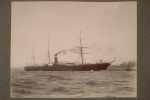Inman steamship City of Berlin, North Atlantic
 |
City of Berlin
(later Berlin, Meade) Liner (1f/3m). L/B: 488.6 bp × 44.2 (148.9m ×
13.5m). Tons: 5,491 grt. Hull: iron. Comp.: 1st 170, 2nd 100, 3rd
1,500. Mach.: compound engine, 1 screw; 15 kts. Built: Caird & Co.,
Greenock, Scotland; 1875.
The Inman Steamship Company's City of Berlin was a remarkable ship in
many respects. Most noticeably, she had the highest length-to-beam
ratio (11 to 1) of any major North
Atlantic steamship. (By comparison, her contemporary Scotia was about
8:1, and France/Norway is about 9:1.) On her fifth voyage between
Liverpool and New York, she twice captured the Blue Riband, crossing
from Queenstown to Sandy Hook at 15.21 knots (7 days, 18 hours, 2
minutes; September 17-25, 1875) and returning at 15.37 knots (7 days,
15 hours, 28 minutes; October 2-10). In December 1879, she became the
first transatlantic steamship fitted with electric lights for interior
spaces. To begin, there were four in the main saloon and two in the
steerage compartments. As the Liverpool Journal of Commerce reported,
the latter "continuously shed a brilliancy hitherto unknown in the
steerage part of any vessel." During a major refit by Laird Brothers
in 1887, City of Berlin was given triple expansion engines and
electric lighting was extended throughout the ship. Inman was
dissolved in 1893, and City of Berlin was sold to the American Line
and renamed Berlin, though she remained on the same route. Two years
later, she passed to the Red Star Line and made seven voyages between
Antwerp and New York. In 1898, she sailed a few times between
Southampton, Queenstown, and New York, but later in the year she was
purchased by the U.S. government and commissioned as the U.S. Army
Transport Service ship Meade. She saw service in both the
Spanish-American War and World War I. Damaged by fire at San Francisco
in 1906, she was scrapped in 1921.
Bonsor, North Atlantic Seaway.
Here are 3 associated individuals:
|
|
